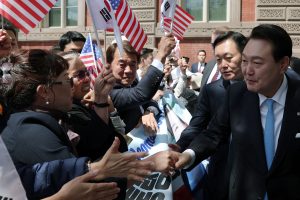Korean Central News Agency, one of the North’s main state-controlled media, published another belittling statement targeting South Korean President Yoon Suk-yeol. Since Yoon held a summit meeting with U.S. President Joe Biden on April 26, the North’s state media has spared no effort to demonize Yoon as the main actor escalating tensions on the Korean Peninsula. On Friday, it highlighted Yoon’s lack of experience and capacity as the leader of South Korea.
“South Korea is just a tool for the U.S. to maintain and realize its own interests, but Yoon mistakenly sees it as U.S. support and assistance for South Korea,” KCNA said.
Exploiting Yoon’s low approval ratings at home and the criticisms arising toward him after the summit, KCNA claimed that the summit was a victory for the United States, not South Korea.
“Although Yoon Suk Yeol led a high-profile business delegation to the U.S., he did not reach any substantive agreement with the Biden administration on the ‘Inflation Reduction Act,’ the ‘CHIPS and Science Act’ and other core issues such as South Korean business investment, product sales, and technological upgrading,” KCNA said. It added that “the U.S. encouraged Yoon to continue to serve the interests of the U.S.”
KCNA’s criticisms of Yoon’s performance at the South Korea-U.S. summit reflect similar themes already being reported by the South Korean domestic media. The summit did not result in any concrete measures addressing Korean concerns about the IRA, even though this was the main agenda for Yoon to protect the interests of major South Korean conglomerates that made tremendous investments in the United States last year. During the joint press conference following the summit, Biden was asked about the South Korean corporations’ concerns about the IRA but he equivocated, saying (without providing any evidence) that their investment in the U.S. would also create jobs in South Korea.
By hitting on these same themes, North Korea seems to be trying to exploit the sharp divide between Yoon’s supporters and his critics. “It is unknown whether Yoon, who has been deceived by the U.S., will calm down after returning home, think and distinguish about the so-called promises and support given by the U.S., and deeply reflect on his mistaken perceptions,” KCNA said.
A separate KCNA article drew attention to anti-Yoon protests in South Korea, which it described as a way for South Koreans to “vent their wrath on the disgusting sycophancy to the U.S. shown by traitor Yoon Suk Yeol during his U.S. visit that brought the danger of a nuclear war to the Korean peninsula and left south Korean people’s living to the tender mercies of outsiders.”
Through their summit, Yoon and Biden sought to prove that they are on the same page regarding the North’s nuclear and missile threats. Announcing the “Washington Declaration” and the establishment of the Nuclear Consultative Group, they clearly repeated that the North’s nuclear attacks on the United States and its allies will cause the end of the Kim regime.
To crack the so-called “ironclad” South Korea-U.S. alliance, Pyongyang published a series of statements highlighting that the summit was for enhancing the interests of the United States, not South Korea.
KCNA argued that the U.S. is controlling Yoon so as to make Seoul work for its interests. To bolster its argument, it cited an article in the Chinese state-owned Global Times that touches on a similar theme.
“Yoon is utterly unaware that the U.S. is using this consultation mechanism to control and influence his ‘administration,’ preventing South Korea from acting recklessly on the nuclear issue and making it strictly obey the U.S. control and instructions,” KCNA said. It also added that Yoon is “blindly following the U.S.” while “the U.S. ignores and despises Yoon inwardly.” Here again, KCNA seems to be couching its criticism in terms similar to those used by some South Korean experts, in a bid to increase its credibility.

































